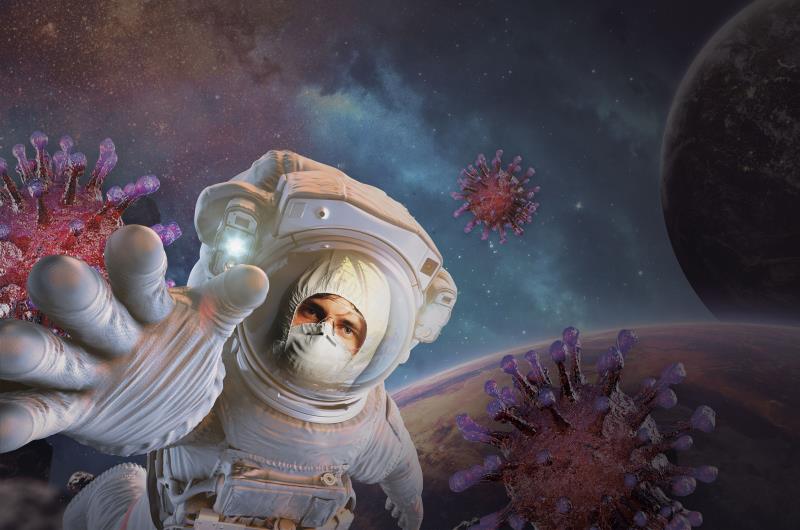
After months of work disruption, profound worrying, social distancing, and isolation, SARS-CoV-2* still rages on, unyielding to human interventions.
The virus latches onto the ACE2** – found abundantly on the cells of the tongue, the oesophagus, the kidneys, the heart, the gastrointestinal tract, and the alveoli of the lungs – and survives for as long as it finds a new host to invade.
Globally, COVID-19 has claimed nearly 212,000 lives and infected over 3 million people. For the second time in a long while – after the 1918 flu pandemic that lasted for 3 years – humanity is again threatened.
Foreign worker dorms have become the new centre of outbreak in Singapore. In Spain, ice rinks have been converted into temporary morgues. And in Iran, malls have been turned into makeshift pandemic hospitals.
Danger down & up
Everyone craves the calm of normalcy. But until a vaccine or herd immunity emerges, easing the restriction protocols may not happen right away. Life is too precious to trade for social or economic comfort.
“Lifting restrictions too quickly could lead to a deadly resurgence,” warned WHO director general Dr Tedros Adhanom Ghebreyesus in a media briefing. “The way down can be as dangerous as the way up, if not managed properly.” [https://www.who.int/dg/speeches/detail/who-director-general-s-opening-remarks-at-the-media-briefing-on-covid-19---10-april-2020]
Although most cases in Western Europe appear to be stable or declining, many countries are still in the early stages of the epidemics, he added. Other countries are starting to see a rebound of the outbreak. Even Singapore, which earned praises for its clear-headed approach in mitigating the transmission, saw a spike in new cases on April 20, recording an all-time high of 1,426 in a day.
“Make no mistake: we have a long way to go,” Ghebreyesus declared. “This virus will be with us for a long time!”
Blunting the blow of coronavirus
There are currently no antivirals engineered or approved by the US Food and Drug Administration (FDA) to prevent or treat COVID-19. But research is underway to mine potential therapies against the virus.
Several drugs with antiviral properties are being tested or repurposed as a potential COVID-19 therapy. New data on compassionate-use remdesivir, originally designed for Ebola, suggest clinical improvement in 36 of 53 patients (68 percent) hospitalized for severe COVID-19. [N Engl J Med 2020;doi: 10.1056/NEJMoa2007016]
Experts, however, warned that as the data came from compassionate use in a wide variety of patients, with no randomization and no control group, true efficacy cannot be established.
In the same vein, scientists from Australia have reported that ivermectin, an FDA-approved antiparasitic drug, can effectively kill SARS-CoV-2 viruses within 48 hours in Vero/hSLAM cells, a lab-grown cell line used as a viral disease model. Effective dose is not established at this stage and more research is needed to determine if an antiviral effect would be elicited in humans. [Antiviral Research 2020;doi.org/10.1016/j.antiviral.2020.104787]
Meanwhile, the antimalarial drug hydroxychloroquine is currently being tested as a post-exposure prophylaxis (PEP) against SARS-CoV-2 in adults exposed to the virus (eg, healthcare workers, patients’ families). Primary results are expected in September 2020. [https://clinicaltrials.gov/ct2/show/NCT04328961, accessed 26 Apr 2020]
The FDA, through an EUA***, has authorized the temporary use of hydroxychloroquine and chloroquine in hospitalized COVID-19 patients outside of clinical trials. But the agency warned against its use for COVID-19 outside of the hospital setting or a clinical trial due to risk of heart rhythm problems. [https://www.fda.gov/drugs/drug-safety-and-availability/fda-cautions-against-use-hydroxychloroquine-or-chloroquine-covid-19-outside-hospital-setting-or, accessed 27 Apr 2020]
Other potential therapeutics
Convalescent plasma transfusion, which delivers antibodies from blood donated by patients who survived COVID-19, is also undergoing trials to check if it can reduce cytokine storm in severely infected patients or serve as chemoprophylaxis in high-risk groups. [https://clinicaltrials.gov/ct2/show/NCT04333355, accessed 27 Apr 2020]
Identifying antibodies that are most effective against SARS-CoV-2 and manufacturing them in the laboratory is another strategy being looked at. Like plasma transfusions, these drugs are built on antibodies and can be mass produced. “This could be a bridge to a vaccine,” said Professor Thomas Moran from Mount Sinai School of Medicine in Manhattan, New York City, New York, US.
Meanwhile, Germany will start its first human trial of an RNA vaccine for COVID-19. [https://www.pei.de/EN/newsroom/press-releases/year/2020/08-first-clinical-trial-sars-cov-2-germany.html, accessed 27 Apr 2020] Unlike a flu shot which contains the inactivated or weakened form of the virus, an RNA vaccine provides body cells the genetic code to construct pathogen components that are not infectious and do not induce a disease. The immune system will then recognize the foreign pathogen components, consider the cells that produced them as putatively infected, and build a protective immune response, which is activated in case of exposure. Simply put, an RNA vaccine turns the body into a vaccine manufacturing unit for its own benefit.
In what critics consider as a desperate move, the FDA greenlighted the sale of about 90 antibody tests for COVID-19 that have not gotten government vetting, saying the pandemic warrants an urgent response. The WHO later warned against the unreliability of these tests to detect COVID-19.
Finding that elusive cure
In the absence of proven specific treatments for COVID-19 other than supportive care, many patients have received off-label and compassionate-use therapies.
“A common interpretation of off-label use and compassionate use of drugs is that if the patients died, they died from the disease, but if the patients survived, they survived because of the given drug. This is not true,” commented Dr Andre Kalil from the University of Nebraska Medical Center in Omaha, Nebraska, US. [JAMA 2020;doi:10.1001/jama.2020.4742]
No clinical evidence currently supports the efficacy and safety of any drug against any coronavirus in humans, including SARS-CoV-2, he added. “The rapid and simultaneous combination of supportive care and randomized clinical trials is the only way to find effective and safe treatments for COVID-19 and any other future outbreak.”